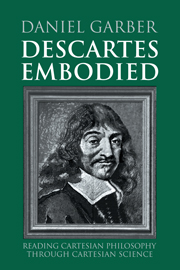Book contents
- Frontmatter
- Contents
- Acknowledgments
- Abbreviations, Citations, and Translations
- Introduction
- Part I Historiographical Preliminaries
- Part II Method, Order, and Certainty
- 2 Descartes and Method in 1637
- 3 A Point of Order: Analysis, Synthesis, and Descartes' Principles (with Lesley Cohen)
- 4 J.-B. Morin and the Second Objections
- 5 Descartes and Experiment in the Discourse and Essays
- 6 Descartes on Knowledge and Certainty: From the Discours to the Principia
- Part III Mind, Body, and the Laws of Nature
- Part IV Larger Visions
- Sources
- Index
5 - Descartes and Experiment in the Discourse and Essays
Published online by Cambridge University Press: 10 November 2009
- Frontmatter
- Contents
- Acknowledgments
- Abbreviations, Citations, and Translations
- Introduction
- Part I Historiographical Preliminaries
- Part II Method, Order, and Certainty
- 2 Descartes and Method in 1637
- 3 A Point of Order: Analysis, Synthesis, and Descartes' Principles (with Lesley Cohen)
- 4 J.-B. Morin and the Second Objections
- 5 Descartes and Experiment in the Discourse and Essays
- 6 Descartes on Knowledge and Certainty: From the Discours to the Principia
- Part III Mind, Body, and the Laws of Nature
- Part IV Larger Visions
- Sources
- Index
Summary
It is generally recognized that knowledge for Descartes is the clear and distinct perception of propositions by the intellect; knowledge in the strictest sense is certain, indeed indubitable, and grounded in the purely rational apprehension of truth. But it is also generally recognized that Descartes was a serious experimenter, at least in his biology and his optics, and that in these areas, at least, he seemed to hold that knowledge requires an appeal to experience and experiment. Writing, for example, in Part VI of the Discourse on Method, Descartes laments the fact that he has neither the time nor the resources to perform all the experiments (expériences) necessary to complete his system, and calls upon his readers to “communicate to me those that they have already made, and to help me in performing those which remain to be done” (AT VI 65). (One can see in the Discourse a clear anticipation of an important later literary form, the grant application.)
To the twentieth-century philosopher this looks a bit puzzling: How can Descartes be both a rationalist, who sees knowledge as deriving from the intellect, and an experimentalist, who sees experiment and observation as essential to the enterprise of knowledge? This is the puzzle I would like to address in this essay. I shall argue that not only is there no contradiction here, but that the appeal to experience is an essential part of the method for constructing a deductive science. We shall begin with a brief account of Descartes' procedure for constructing his science, his method.
- Type
- Chapter
- Information
- Descartes EmbodiedReading Cartesian Philosophy through Cartesian Science, pp. 85 - 110Publisher: Cambridge University PressPrint publication year: 2000
- 3
- Cited by



